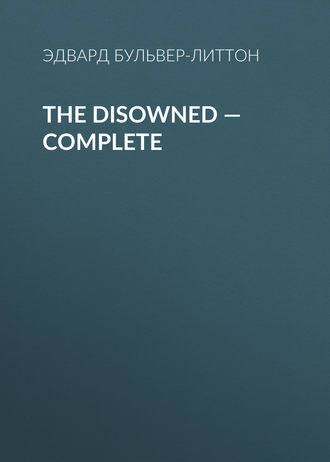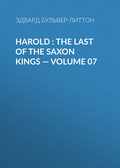
Эдвард Бульвер-Литтон
The Disowned — Complete
CHAPTER LXXVIII
Iden.—But thou wilt brave me in these saucy terms.
Cade.—Brave thee I ay, by the best blood that ever was broached, and beard thee too.
—SHAKSPEARE.
“You see, my lord,” said Mr. Glumford to Lord Ulswater, as they rode slowly on, “that as long as those rebellious scoundrels are indulged in their spoutings and meetings, and that sort of thing, that—that there will be no bearing them.”
“Very judiciously remarked, sir,” replied Lord Ulswater. “I wish all gentlemen of birth and consideration viewed the question in the same calm, dispassionate, and profound light that you do. Would to Heaven it were left to me to clear the country of those mutinous and dangerous rascals: I would make speedy and sure work of it.”
“I am certain you would, my lord; I am certain you would. It is a thousand pities that pompous fellow Mordaunt interfered yesterday, with his moderation, and policy, and all that sort of thing; so foolish, you know, my lord,—mere theory and romance, and that sort of thing: we should have had it all our own way, if he had not.”
Lord Ulswater played with his riding-whip, but did not reply. Mr. Glumford continued,—
“Pray, my lord, did your lordship see what an ugly ill-dressed set of dogs those meetingers were; that Wolfe, above all? Oh, he’s a horrid-looking fellow. By the by, he left the town this very morning; I saw him take leave of his friends in the street just before I set out. He is going to some other meeting,—on foot too. Only think of the folly of talking about the policy and prudence and humanity, and that sort of thing, of sparing such a pitiful poor fellow as that; can’t afford a chaise, or a stage-coach even, my lord,—positively can’t.”
“You see the matter exactly in its true light, Mr. Glumford,” said his lordship, patting his fine horse, which was somewhat impatient of the slow pace of its companion.
“A very beautiful animal of your lordship,” said Mr. Glumford, spurring his own horse,—a heavy, dull quadruped with an obstinate ill-set tail, a low shoulder, and a Roman nose. “I am very partial to horses myself, and love a fine horse as well as anybody.” Lord Ulswater cast a glance at his companion’s steed, and seeing nothing in its qualities to justify this assertion of attachment to fine horses was silent: Lord Ulswater never flattered even his mistress, much less Mr. Glumford.
“I will tell you, my lord,” continued Mr. Glumford, “what a bargain this horse was;” and the squire proceeded, much to Lord Ulswater’s discontent, to retail the history of his craft in making the said bargain.
The riders were now entering a part of the road, a little more than two miles from Westborough Park, in which the features of the neighbouring country took a bolder and ruder aspect than they had hitherto worn. On one side of the road, the view opened upon a descent of considerable depth, and the dull sun looked drearily over a valley in which large fallow fields, a distant and solitary spire, and a few stunted and withering trees formed the chief characteristics. On the other side of the road a narrow footpath was separated from the highway by occasional posts; and on this path Lord Ulswater (how the minute and daily occurrences of life show the grand pervading principles of character!) was, at the time we refer to, riding, in preference to the established thoroughfare for equestrian and aurigal travellers. The side of this path farthest from the road was bordered by a steep declivity of stony and gravelly earth, which almost deserved the dignified appellation of a precipice; and it was with no small exertion of dexterous horsemanship that Lord Ulswater kept his spirited and susceptible steed upon the narrow and somewhat perilous path, in spite of its frequent starts at the rugged descent below.
“I think, my lord, if I may venture to say so,” said Mr. Glumford, having just finished the narration of his bargain, “that it would be better for you to take the high road just at present; for the descent from the footpath is steep and abrupt, and deuced crumbling! so that if your lordship’s horse shied or took a wrong step, it might be attended with unpleasant consequences,—a fall, or that sort of thing.”
“You are very good, sir,” said Lord Ulswater, who, like most proud people, conceived advice an insult; “but I imagine myself capable of guiding my horse, at least upon a road so excellent as this.”
“Certainly, my lord, certainly; I beg your pardon; but—bless me, who is that tall fellow in black, talking to himself yonder, my lord? The turn of the road hides him from you just at present; but I see him well. Ha! ha! what gestures he uses! I dare say he is one of the petitioners, and—yes, my lord, by Jupiter, it is Wolfe himself! You had better (excuse me, my lord) come down from the footpath: it is not wide enough for two people; and Wolfe, I dare say, a d—d rascal, would not get out of the way for the devil himself! He’s a nasty, black, fierce-looking fellow; I would not for something meet him in a dark night, or that sort of thing!”
“I do not exactly understand, Mr. Glumford,” returned Lord Ulswater, with a supercilious glance at that gentleman, “what peculiarities of temper you are pleased to impute to me, or from what you deduce the supposition that I shall move out of my way for a person like Mr. Woolt, or Wolfe, or whatever be his name.”
“I beg your pardon, my lord, I am sure,” answered Glumford: “of course your lordship knows best, and if the rogue is impertinent, why, I’m a magistrate, and will commit him; though, to be sure,” continued our righteous Daniel, in a lower key, “he has a right to walk upon the footpath without being ridden over, or that sort of thing.”
The equestrians were now very near Wolfe, who, turning hastily round, perceived, and immediately recognized Lord Ulswater. “Ah-ha!” muttered he to himself, “here comes the insolent thirster for blood, grudging us seemingly even the meagre comfort of the path which his horse’s hoofs are breaking up; yet, thank Heaven,” added the republican, looking with a stern satisfaction at the narrowness of the footing, “he cannot very well pass me, and the free lion does not move out of his way for such pampered kine as those to which this creature belongs.”
Actuated by this thought, Wolfe almost insensibly moved entirely into the middle of the path, so that with the posts on one side, and the abrupt and undefended precipice, if we may so call it, on the other, it was quite impossible for any horseman to pass the republican, unless over his body.
Lord Ulswater marked the motion, and did not want penetration to perceive the cause. Glad of an opportunity to wreak some portion of his irritation against a member of a body so offensive to his mind, and which had the day before obtained a sort of triumph over his exertions against them, and rendered obstinate in his intention by the pique he had felt at Glumford’s caution, Lord Ulswater, tightening his rein and humming with apparent indifference a popular tune, continued his progress till he was within a foot of the republican. Then, checking his horse for a moment, he called, in a tone of quiet arrogance, to Wolfe to withdraw himself on one side till he had passed.
The fierce blood of the republican, which the least breath of oppression sufficed to kindle, and which yet boiled with the remembrance of Lord Ulswater’s threat to him two nights before, was on fire at this command. He stopped short, and turning half round, stood erect in the strength and power of his singularly tall and not ungraceful form. “Poor and proud fool,” said he, with a voice of the most biting scorn, and fixing an eye eloquent of ire and menaced danger upon the calmly contemptuous countenance of the patrician, “poor and proud fool, do you think that your privileges have already reached so pleasant a pitch that you may ride over men like dust? Off, fool! the basest peasant in England, degraded as he is, would resist while he ridiculed your arrogance.”
Without deigning any reply, Lord Ulswater spurred his horse; the spirited animal bounded forward almost on the very person of the obstructer of the path; with uncommon agility Wolfe drew aside from the danger, seized with a powerful grasp the bridle, and abruptly arresting the horse backed it fearfully towards the descent. Enraged beyond all presence of mind, the fated nobleman, raising his whip, struck violently at the republican. The latter, as he felt the blow, uttered a single shout of such ferocity that it curdled the timorous blood of Glumford, and with a giant and iron hand he backed the horse several paces down the precipice. The treacherous earth crumbled beneath the weight, and Lord Ulswater spurring his steed violently at the same instant that Wolfe so sharply and strongly curbed it, the affrighted animal reared violently, forced the rein from Wolfe, stood erect for a moment of horror to the spectator, and then, as its footing and balance alike failed, it fell backward, and rolled over and over its unfortunate and helpless rider.
“Good heavens!” cried Glumford, who had sat quietly upon his dozing horse, watching the result of the dispute, “what have you done? you have killed his lordship,—positively killed him,—and his horse, too, I dare say. You shall be hanged for this, sir, as sure as I am a magistrate, and that sort of thing.”
Unheeding this denunciation, Wolfe had made to the spot where rider and horse lay blent together at the foot of the descent; and assisting the latter to rise, bent down to examine the real effect of his violence. “Methinks,” said he, as he looked upon the hueless but still defying features of the horseman, “methinks I have seen that face years before,—but where? Perhaps my dreams have foretold me this.”
Lord Ulswater was utterly senseless; and as Wolfe raised him, he saw that the right side of the head was covered with blood, and that one arm seemed crushed and broken. Meanwhile a carriage had appeared, was hailed by Glumford, stopped; and on being informed of the circumstance and the rank of the sufferer, the traveller, a single gentleman, descended, assisted to raise the unhappy nobleman, placed him in the carriage, and, obeying Glumford’s instructions, proceeded slowly to Westborough Park.
“But the ruffian, the rebel, the murderer?” said Mr. Glumford, both querulously and inquiringly, looking towards Wolfe, who, without having attempted to assist his victim, stood aloof, with arms folded, and an expression of sated ferocity upon his speaking features.
“Oh! as to him,” quoth the traveller, stepping into his carriage, in order to support the mangled man, “you, sir, and my valet can bring him along with you, or take him to the next town, or do, in short, with him just as you please, only be sure he does not escape; drive on, post-boy, very gently.” And poor Mr. Glumford found the muscular form of the stern Wolfe consigned to the sole care of himself and a very diminutive man in pea-green silk stockings, who, however excellently well he might perform the office of valet, was certainly by no means calculated in physical powers for the detention of a criminal.
Wolfe saved the pair a world of trouble and anxiety.
“Sir,” said he, gravely, turning to Glumford, “you beheld the affray, and whatever its consequences will do me the common justice of witnessing as to the fact of the first aggressor. It will, however, be satisfactory to both of us to seize the earliest opportunity of putting the matter upon a legal footing, and I shall therefore return to W——, to which town you will doubtless accompany me.”
“With all my heart!” cried Mr. Glumford, feeling as if a mountain of responsibility were taken from his breast. “And I wish to Heaven you may be transported instead of hanged.”
CHAPTER LXXIX
But gasping heaved the breath that Lara drew,
And dull the film along his dim eye grew.
—BYRON.
The light broke partially through the half-closed shutters of the room in which lay Lord Ulswater, who, awakened to sense and pain by the motion of the carriage, had now relapsed into insensibility. By the side of the sofa on which he was laid, knelt Clarence, bathing one hand with tears violent and fast; on the opposite side leaned over, with bald front, and an expression of mingled fear and sorrow upon his intent countenance, the old steward; while, at a little distance, Lord Westborough, who had been wheeled into the room, sat mute in his chair, aghast with bewilderment and horror, and counting every moment to the arrival of the surgeon, who had been sent for. The stranger to whom the carriage belonged stood by the window, detailing in a low voice to the chaplain of the house what particulars of the occurrence he was acquainted with, while the youngest scion of the family, a boy of about ten years, and who in the general confusion had thrust himself unnoticed into the room, stood close to the pair, with open mouth and thirsting ears and a face on which childish interest at a fearful tale was strongly blent with the more absorbed feeling of terror at the truth.
Slowly Lord Ulswater opened his eyes; they rested upon Clarence.
“My brother! my brother!” cried Clarence, in a voice of powerful anguish, “is it thus—thus that you have come hither to—” He stopped in the gushing fulness of his heart. Extricating from Clarence the only hand he was able to use, Lord Ulswater raised it to his brow, as if in the effort to clear remembrance; and then, turning to Wardour, seemed to ask the truth of Clarence’s claim,—at least so the old man interpreted the meaning of his eye, and the faint and scarce intelligible words which broke from his lips.
“It is; it is, my honoured lord,” cried he, struggling with his emotion; “it is your brother, your lost brother, Clinton L’Estrange.” And as he said these words, Clarence felt the damp chill hand of his brother press his own, and knew by that pressure and the smile—kind, though brief from exceeding pain—with which the ill-fated nobleman looked upon him, that the claim long unknown was at last acknowledged, and the ties long broken united, though in death.
The surgeon arrived: the room was cleared of all but Clarence; the first examination was sufficient. Unaware of Clarence’s close relationship to the sufferer, the surgeon took him aside. “A very painful operation,” said he, “might be performed, but it would only torture, in vain, the last moments of the patient; no human skill can save or even protract his life.”
The doomed man, who, though in great pain, was still sensible, stirred. His brother flew towards him. “Flora,” he murmured, “let me see her, I implore.”
Curbing, as much as he was able, his emotion, and conquering his reluctance to leave the sufferer even for a moment, Clarence flew in search of Lady Flora. He found her; in rapid and hasty words, he signified the wish of the dying man, and hurried her, confused, trembling, and scarce conscious of the melancholy scene she was about to witness, to the side of her affianced bridegroom.
I have been by the death-beds of many men, and I have noted that shortly before death, as the frame grows weaker and weaker, the fiercer passions yield to those feelings better harmonizing with the awfulness of the hour. Thoughts soft and tender, which seem little to belong to the character in the health and vigour of former years, obtain then an empire, brief, indeed, but utter for the time they last; and this is the more impressive because (as in the present instance I shall have occasion to portray) in the moments which succeed and make the very latest of life, the ruling passion, suppressed for an interval by such gentler feelings, sometimes again returns to take its final triumph over that frail clay, which, through existence, it has swayed, agitated, and moulded like wax unto its will.
When Lord Ulswater saw Flora approach and bend weepingly over him, a momentary softness stole over his face. Taking her hand he extended it towards Clarence, and turning to the latter faltered out, “Let this—my—brother—atone—for—;” apparently unable to finish the sentence, he then relaxed his hold and sank upon the pillow; and so still, so apparently breathless did he remain for several minutes, that they thought the latest agony was over.
As, yielding to this impression, Clarence was about to withdraw the scarce conscious Flora from the chamber, words, less tremulous and indistinct than aught which he had yet uttered, broke from Lord Ulswater’s lips. Clarence hastened to him; and bending over his countenance saw that even through the rapid changes and shades of death, it darkened with the peculiar characteristics of the unreleased soul within: the brow was knit into more than its wonted sternness and pride; and in the eye which glared upon the opposite wall, the light of the waning life broke into a momentary blaze,—that flash, so rapid and evanescent, before the air drinks in the last spark of the being it has animated, and night—the starless and eternal—falls over the extinguished lamp! The hand of the right arm (which was that unshattered by the fall) was clenched and raised; but, when the words which came upon Clarence’s ear had ceased, it fell heavily by his side, like a clod of that clay which it had then become. In those words it seemed as if, in the confused delirium of passing existence, the brave soldier mingled some dim and bewildered recollection of former battles with that of his last most fatal though most ignoble strife.
“Down, down with them!” he muttered between his teeth, though in a tone startlingly deep and audible; “down with them! No quarter to the infidels! strike for England and Effingham. Ha!—who strives for flight there!—kill him! no mercy, I say,—none!—there, there, I have despatched him; ha! ha! What, still alive?—off, slave, off! Oh, slain! slain in a ditch, by a base-born hind; oh, bitter! bitter! bitter!” And with these words, of which the last, from their piercing anguish and keen despair, made a dread contrast with the fire and defiance of the first, the jaw fell, the flashing and fierce eye glazed and set, and all of the haughty and bold patrician which the earth retained was—dust!
CHAPTER LXXX
Il n'est jamais permis de deteriorer une ame humaine pour l'avantage des autres, ni de faire un scelerat pour le service des honnetes gens.—ROUSSEAU.
["It is not permitted us to degrade one single soul for the sake of conferring advantage on others, nor to make a rogue for the good of the honest."]
As the reader approaches the termination of this narrative, and looks back upon the many scenes he has passed, perhaps, in the mimic representation of human life, he may find no unfaithful resemblance to the true.
As, amongst the crowd of characters jostled against each other in their course, some drop off at the first, the second, or the third stage, and leave a few only continuing to the last, while Fate chooses her agents and survivors among those whom the bystander, perchance, least noticed as the objects of her selection; and they who, haply, seemed to him, at first, among the most conspicuous as characters, sink, some abruptly, some gradually, into actors of the least importance in events; as the reader notes the same passion, in different strata, producing the most opposite qualities, and gathers from that notice some estimate of the vast perplexity in the code of morals, deemed by the shallow so plain a science; when he finds that a similar and single feeling will produce both the virtue we love and the vice we detest, the magnanimity we admire and the meanness we despise; as the feeble hands of the author force into contrast ignorance and wisdom, the affectation of philosophy and its true essence, coarseness and refinement, the lowest vulgarity of sentiment with an exaltation of feeling approaching to morbidity, the reality of virtue with the counterfeit, the glory of the Divinity with the hideousness of the Idol, sorrow and eager joy, marriage and death, tears and their young successors, smiles; as all, blent together, these varieties of life form a single yet many-coloured web, leaving us to doubt whether, in fortune the bright hue or the dark, in character the base material or the rich, predominate,—the workman of the web could almost reconcile himself to his glaring and great deficiency in art by the fond persuasion that he has, at least in his choice of tint and texture, caught something of the likeness of Nature: but he knows, to the abasement of his vanity, that these enumerated particulars of resemblance to life are common to all, even to the most unskilful of his brethren; and it is not the mere act of copying a true original, but the rare circumstance of force and accuracy in the copy, which can alone constitute a just pretension to merit, or flatter the artist with the hope of a moderate success.
The news of Lord Ulswater’s untimely death soon spread around the neighbourhood, and was conveyed to Mordaunt by the very gentleman whom that nobleman had charged with his hostile message. Algernon repaired at once to W——, to gather from Wolfe some less exaggerated account of the affray than that which the many tongues of Rumour had brought to him.
It was no difficult matter to see the precise share of blame to be attached to Wolfe; and, notwithstanding the biased account of Glumford and the strong spirit of party then existing in the country, no rational man could for a moment term the event of a sudden fray a premeditated murder, or the violence of the aggrieved the black offence of a wilful criminal. Wolfe, therefore, soon obtained a release from the confinement to which he had been at first committed; and with a temper still more exasperated by the evident disposition of his auditors to have treated him, had it been possible, with the utmost rigour, he returned to companions well calculated by their converse and bent of mind to inflame the fester of his moral constitution.
It happens generally that men very vehement in any particular opinion choose their friends, not for a general similarity of character, but in proportion to their mutual congeniality of sentiment upon that particular opinion; it happens, also, that those most audibly violent, if we may so speak, upon any opinion, moral or political, are rarely the wisest or the purest of their party. Those with whom Wolfe was intimate were men who shared none of the nobler characteristics of the republican; still less did they participate in or even comprehend the enlightened and benevolent views for which the wise and great men of that sect—a sect to which all philanthropy is, perhaps too fondly, inclined to lean—have been so conspicuously eminent. On the contrary, Wolfe’s comrades, without education and consequently without principle, had been driven to disaffection by desperate fortunes and ruined reputations acting upon minds polluted by the ignorance and hardened among the dross of the populace. But the worst can by constant intercourse corrupt the best; and the barriers of good and evil, often confused in Wolfe’s mind by the blindness of his passions, seemed, as his intercourse with these lawless and ruffian associates thickened, to be at last utterly broken down and swept away.
Unhappily too—soon after Wolfe’s return to London—the popular irritation showed itself in mobs, perhaps rather to be termed disorderly than seditious. The ministers, however, thought otherwise; the military were summoned, and much injury, resulting, it is to be hoped, from accident, not design, ensued to many of the persons assembled. Some were severely wounded by the swords of the soldiers; others maimed and trampled upon by the horses, which shared the agitation or irritability of their riders; and a few, among whom were two women and three children, lost their lives. Wolfe had been one of the crowd; and the scene, melancholy as it really was, and appearing to his temper unredeemed and inexcusable on the part of the soldiers, left on his mind a deep and burning impression of revenge. Justice (as they termed it) was demanded by strong bodies of the people upon the soldiers; but the administration, deeming it politic rather to awe than to conciliate, so far from censuring the military, approved their exertions.
From that time Wolfe appears to have resolved upon the execution of a design which he had long imperfectly and confusedly meditated.
This was no less a crime (and to him did conscientiously seem no less a virtue) than to seize a favourable opportunity for assassinating the most prominent member of the administration, and the one who, above all the rest, was the most odious to the disaffected. It must be urged, in extenuation of the atrocity of this design, that a man perpetually brooding over one scheme, which to him has become the very sustenance of existence, and which scheme, perpetually frustrated, grows desperate by disappointment, acquires a heat of morbid and oblique enthusiasm, which may be not unreasonably termed insanity; and that, at the very time Wolfe reconciled it to his conscience to commit the murder of his fellow creature, he would have moved out of his path for a worm. Assassination, indeed, seemed to him justice; and a felon’s execution the glory of martyrdom. And yet, O Fanatic, thou didst anathematize the Duellist as the Man of blood: what is the Assassin?







